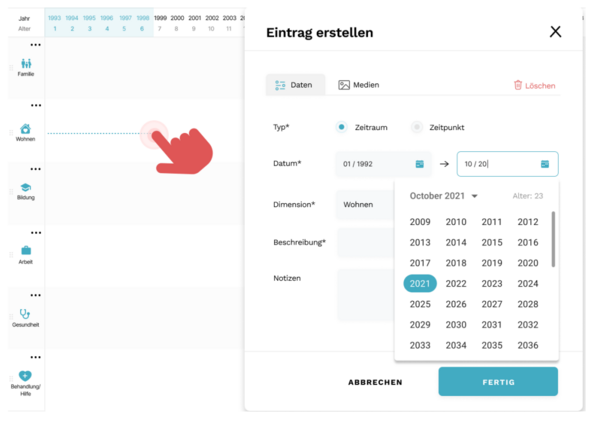Development History
easyBiograph is becoming increasing established as a process for visualising biographical sequences among Social Work professionals in the German-speaking area.
For visualising biographies, a new web-based programme was developed that allows for the multidimensional presentation of life events and phases, thus replacing the previous version of easyBiograph. The idea was for this new programme to enable the user-controlled enlargement of eventful life phases and the integration of images and photos. Further functions of the programme were determined within the framework of the participatory development process.
The project also resulted in concepts for transnational teaching activities in the field of social diagnosis and digital toolkits with articles, presentations, guidelines, instructional videos, and handbooks on this topic. Information on the project can be found at https://research.fhstp.ac.at/projekte/transsodia-kooperative-soziale-diagnostik-transnational-und-digital-lehren-und-lernen.
Funded by the European Union. Views and opinions expressed are however those of the author(s) only and do not necessarily reflect those of the European Union or OeAD-GmbH. Neither the European Union nor the granting authority can be held responsible for them.
Within the framework of her master thesis “Interaktive Datenvisualisierung für die kooperative Rekonstruktion der Biografie in der sozialen Diagnostik auf mobilen Endgeräten“, Michaela Buschberger developed a new concept for the easyBiograph in the study programme Interactive Technologies. The thesis was supervised by Alexander Rind and Christina Stoiber.
Nikolaus Kelis, a student of the degree programme Industrial Simulation, developed the basic version of the easyBiograph as part of his master thesis “Entwicklung der easyBiograph und Vergleich mit anderer Timeline Software“.
Concerning the starting situation, he stated: “In this field, we lack a suitable application of a tool that facilitates and improves patients’ diagnosis. While there are sufficient applications in the medical realm, these are either complicated to set up, too extensive, or restricted. Within the framework of my thesis, a new tool was developed in Java that was optimised for the special requirements of Social Work. These were defined by Social Workers in order to assess the application’s practicability. The newly created software was subjected to a comparison test with existing applications to assess its actual feasibility and its benefits.”
The project was professionally supervised by Peter Pantuček Eisenbacher and Sabine Sommer.

